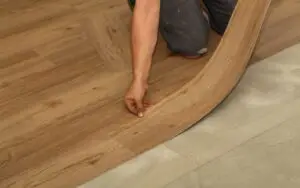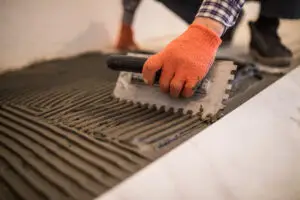Understanding Budget-Friendly Flooring
Factors Affecting Flooring Costs
Material Costs
The material cost is a major factor in determining the overall cost of flooring. Some materials, such as natural stone and hardwood, are typically more expensive, while other materials, such as sheet vinyl, laminate, and carpet, are often more affordable. The type of material you choose will always have the biggest impact on your overall budget, which is why it is so important to do your research, and to consider all of your options carefully.
Installation Costs
Installation costs also play a significant role in the total price of a new floor. Some materials, such as sheet vinyl, are relatively easy to install, and will cost less for labor. Other materials, such as hardwood or tile, require more skill and time to install, which will result in higher labor costs. Professional installers can often offer the best value by offering quick and efficient installations, regardless of the material that is selected.
Long-Term Maintenance
Long-term maintenance is another important factor to consider when selecting a flooring material. Some materials, such as vinyl, are very low maintenance and easy to clean, while other materials, such as carpet, require more frequent cleaning and care. Lower maintenance flooring materials may cost more initially, but can save you time and money in the long run. Professional installers will always be available to answer any questions about maintenance, and help you choose a material that is right for you.
Types of Flooring and Their Cost Ranges
Sheet Vinyl
Sheet vinyl is often the least expensive flooring material, and provides a good balance between cost and durability. The material typically costs between $0.50 and $2 per square foot, depending on the quality and thickness. Sheet vinyl is also often easy to install, which can save money on labor costs. It is an excellent choice for homeowners on a tight budget, who are looking for a low cost option that is also durable.
Laminate
Laminate flooring is another popular option that is more affordable than hardwood or tile. Laminate typically costs between $1 and $4 per square foot. While it is not as durable or water-resistant as vinyl or tile, it can still be a great option for homeowners on a budget, who are also seeking a floor that is durable and stylish.
Carpet
Carpet is a versatile and comfortable flooring option that is available in a wide range of prices. The cost of carpet can range anywhere from $1 to $6 per square foot, depending on the quality, type of material, and the style of the carpet. While there are many affordable options available, it is always important to choose a carpet that is both durable and that will fit within your budget. Professional installers can always help you choose a carpet that is perfect for your needs.
Engineered Wood
Engineered wood is a more affordable alternative to solid hardwood flooring, and it typically costs between $2 and $8 per square foot. Engineered wood is durable and has a very beautiful and luxurious appearance, while still being more affordable than traditional hardwood. It is an excellent choice for homeowners who want the look of wood without the high cost, and can be an excellent option for those seeking a durable floor on a budget.
The Least Expensive Flooring Options
Sheet Vinyl Flooring
Cost and Durability
Sheet vinyl flooring is one of the most affordable options, and it’s also very durable and easy to maintain. It is highly resistant to scratches, stains, and moisture, making it a popular choice for high traffic areas, bathrooms, and kitchens. While it is often the least expensive flooring option, it can also be one of the most versatile and durable options as well.
Installation Methods
Sheet vinyl is relatively easy to install, which makes it popular for DIY projects. However, proper installation is crucial for its longevity and performance. Professional installers have all of the required tools and techniques to install sheet vinyl correctly, and to protect your investment. They also have the knowledge to avoid many of the pitfalls of DIY installs.
Pros and Cons
The pros of sheet vinyl flooring include its low cost, durability, and ease of maintenance. However, the cons include a shorter lifespan compared to other flooring options, and it may not be as visually appealing as other types of flooring. Sheet vinyl is a great choice for those on a strict budget, and who are also seeking a durable floor.
Laminate Flooring
Cost and Durability
Laminate flooring is another budget-friendly option, that offers a good balance between cost and durability. It is also relatively easy to install, and it comes in a wide variety of styles and colors, making it a great choice for many different design styles. While it is not as water-resistant as vinyl, it is still a great option for many homes, and businesses, that are seeking a budget-friendly option.
Installation Methods
Laminate flooring is relatively easy to install, due to its click-lock system, which makes it a popular choice for DIY installations. However, proper subfloor preparation is essential to ensure a long lasting and durable floor, and should always be performed by a professional installer. Professional installers also have the tools and knowledge to ensure that the laminate floor is installed correctly, and will always provide the best results.
Pros and Cons
The pros of laminate flooring include its affordability, its wide variety of styles, and its relative ease of installation. However, the cons include a reduced resistance to moisture, and a shorter lifespan compared to tile and hardwood. Despite these minor issues, laminate is an excellent choice for those on a budget who also want a floor that is stylish and relatively durable.
Carpet Flooring
Cost and Durability
Carpet flooring is another cost-effective option, and it is available in a wide range of prices, styles, and materials. The cost and durability of carpet will depend on its construction, and the type of fibers that are used. Higher quality carpets will often cost more, but they also tend to be more durable, and stain resistant, which is why it is always important to consider both price and quality when choosing a new carpet.
Installation Methods
Carpet installation requires specialized tools and techniques, such as stretching, and tacking, so it is typically best left to professional installers. While it is possible to install carpet yourself, it is also very difficult to do properly, and DIY carpet installs often lead to many problems such as wrinkles, and loose carpet, and these issues will always require a professional to correct.
Pros and Cons
The pros of carpet flooring include its affordability, its versatility, and its comfort and warmth. However, the cons include a reduced lifespan, increased maintenance requirements, and a tendency to attract dust and allergens, which is not ideal for some situations. Despite these minor issues, carpet is still an excellent and cost-effective option for most homes.
Balancing Cost and Quality
Finding Value in Budget-Friendly Options
Understanding Material Grades
When choosing budget-friendly flooring, it’s essential to understand the different grades of material. Lower-grade materials might be more affordable, but they may not be as durable, or may not look as high-quality, as other, more expensive options. Professional installers can often recommend the best materials that provide the best value, without sacrificing quality or durability.
Considering Installation Needs
When selecting a budget-friendly option, it is also important to consider the installation needs of the product. Some materials are easier to install than others, which will often save you money on labor costs. Professional installers will always be upfront with all of your options, and will always be able to provide a detailed quote, that will fit within your budget.
The Role of Professional Installation
Expertise and Efficiency
Professional installers bring expertise and efficiency to every flooring project, and they are able to complete projects much more quickly and efficiently than a DIYer. Their skills and knowledge allow them to complete any type of flooring installation correctly, without any unnecessary issues, and they will also guarantee all of their work.
Preventing Costly Mistakes
Professional flooring installation can also save you money by preventing costly mistakes. They are experts in all types of flooring and know how to install them correctly, while avoiding all of the common pitfalls of DIY installations. This often saves time, money, and a lot of frustration.
DIY vs Professional Installation: Budget Considerations
DIY Installation: Potential Savings and Risks
Initial Savings
DIY installation can initially seem like a way to save money on labor costs, however it can also come with many hidden costs such as the need to purchase or rent expensive tools, and the potential for mistakes that may require professional repairs. Because of these potential issues, DIY projects do not always save money, and may actually end up costing more in the long run.
Potential for Errors
DIY flooring installation projects are very prone to errors, such as improper subfloor preparation, misaligned planks or tiles, and incorrect cuts, which will often require a professional to correct, costing even more than if you had hired a professional in the first place. This is why it is always recommended to hire a professional, as it protects your investment, and also ensures a beautiful, durable, and long-lasting result.
Professional Installation: Value and Guarantees
Expertise and Quality
Professional flooring installation services will always guarantee expertise and quality, and they will always ensure that your new floors are installed correctly, and will last for many years to come. They also provide warranties to protect your investment, and they will also provide peace of mind that is not available with DIY projects.
Warranty and Peace of Mind
Professional installers will also always offer warranties and guarantees that will protect your flooring investment. With a warranty you can rest assured that if any issues should arise, the professional installer will address the problem without any extra cost to you. This level of assurance is rarely offered with DIY projects.
Case Studies: Budget Flooring Success
Example of Low-Cost Vinyl Done Right
A homeowner installed sheet vinyl flooring in their basement. They chose a mid grade vinyl, and hired a professional installer to perform the install. The professional installer was able to provide a smooth and even install, while also providing them with an affordable option that fit their budget, and that also looked great, and lasted for many years.
Example of a Cost Effective Laminate Install
Another homeowner chose laminate flooring for their living room, and hired a professional to complete the installation. The professional was able to perform a quick and efficient install, while also ensuring a high quality result, that protected their investment, and also looked great. This shows the value of choosing a professional installer, when installing any type of flooring, even budget-friendly options.
FAQs & Answers
Sheet vinyl flooring is generally considered to be the least expensive type of flooring material, with laminate and carpet as close runners up. However, costs can vary depending on the quality of the material, the complexity of the installation, and the specific labor rates in your area. Professional installers can provide a variety of options, and will help you choose the best fit for your needs and budget.
Installation costs for sheet vinyl are typically lower due to its ease of installation. Laminate and carpet installation costs can vary, depending on the specific product, and the complexity of the installation. Professional installers are familiar with all types of flooring, and can provide accurate estimates that will fit any budget. They also have the skills to ensure a high-quality installation, regardless of the type of flooring that you select.
Some potential drawbacks of choosing the cheapest flooring include reduced durability, a shorter lifespan, less resistance to moisture, and a less desirable appearance. While cost is always a consideration, you also want to make sure the material is durable, and can withstand normal wear and tear. Professional installers can offer you a variety of different options that fit every budget.
Professional flooring installation can help you get the best value by ensuring that the flooring is installed correctly, which will protect the materials, and will help to prevent any damage, or costly repairs. Professional installers have the expertise, skills, and tools needed to maximize the lifespan of your new floor, which will always save money in the long run. They will also offer a warranty that will protect your investment, and give you peace of mind.
While DIY flooring installation might seem like a way to save money, it often comes with hidden costs such as the need to purchase or rent specialized tools, the potential for installation errors, and the time investment required. These types of issues can often cost much more than hiring a professional installer, which is why most homeowners choose a professional. Professional installers can do the job correctly the first time, and they can offer a warranty, that protects your investment.





